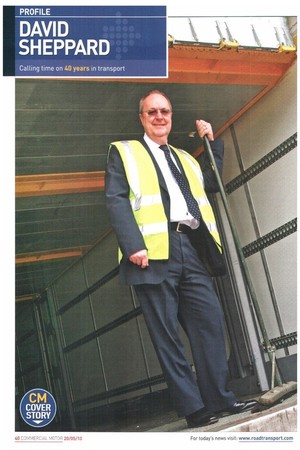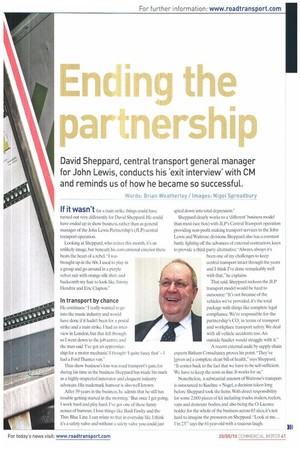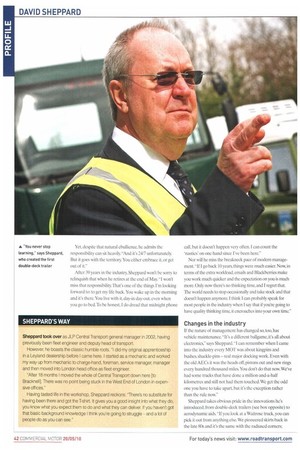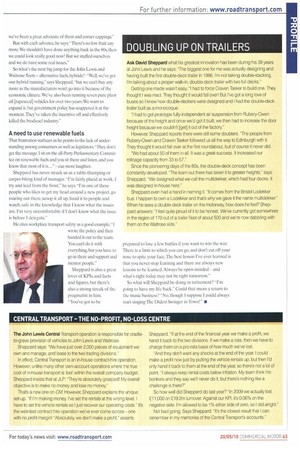DAVID SHEPPARD
Page 40

Page 41

Page 42

Page 43

If you've noticed an error in this article please click here to report it so we can fix it.
Calling time on 40 years in transport
David Sheppard, central transport general manager for John Lewis, conducts his "exit interview' with CM and reminds us of how he became so successful.
Words: Brian Weathertey / Images: Nigel. Spreadbury If it wasn't for a train strike things could have turned out very differently for David Sheppard. He could have ended up in show business, rather than as general manager of the John Lewis Partnership's (JLP) central transport operation.
Looking at Sheppard, who retires this month, it's an unlikely image, but beneath his conventional exterior there beats the heart of a rebel."1 was brought up in the 60s. I used to play in a group and go around in a purple velvet suit with orange silk shirt, and backcomb my hair to look like Jimmy Hendrix and Eric Clapton."
In transport by chance
He continues: -1 really wanted to go into the music industry and would have done if it hadn't been for a postal strike and a train strike. I had an interview in London, but that fell through so I went down to the job centre and the man said Tye got an apprenticeship for a motor mechanic! I thought'! quite fancy that' — I had a Ford Thames van."
Thus show business's loss was road transport's gain, for during his time in the business Sheppard has made his mark as a highly-respected innovator and eloquent industry advocate. His trademark humour is also well known.
After 39 years in the business, he admits that he still has trouble getting started in the morning. "But once I get going, I work hard and play hard, I've got one of these funny senses of humour.! love things like Basil Pawky and the Thin Blue Line. I can relate to that in everyday life. 1 think it's a safety valve and without a safety valve you could just
spiral down into total depression."
Sheppard clearly works to a 'different' business model than most (see box) with JLP's Central Transport operation providing non-profit making transport services to the John Lewis and Waitrose divisions. Sheppard also has a constant battle fighting off the advances of external contractors, keen to provide a third-party alternative. "Always, always it's been one of my challenges to keep central transport intact through the years and 1 think I've done remarkably well with that," he explains.
That said, Sheppard reckons the JLP transport model would be hard to outsource:"It's not because of the vehicles we've provided, it's the total package with things like complete legal compliance. We're responsible for the partnership's CO2 in terms of transport and workplace transport safety. We deal with all vehicle accidents too. An outside haulier would struggle with it."
A recent external audit by supply chain experts Bisham Consultancy proves his point. "They've [given us] a complete clean bill of health," says Sheppard. "It comes back to the fact that we have to be self-sufficient. We have to keep the costs in-line. It works for us."
Nonetheless, a substantial amount of Waitrose's transport is oulsourced to Kuelme + Nagel, a decision taken long before Sheppard took the helm. With direct responsibility for some 2,000 pieces of kit including trucks, trailers, reefers, vans and demount bodies, and also being the 0-Licence holder for the whole of the business across 65 sites, it's not hard to imagine the pressures on Sheppard. "Look at me... I'm 23!" says the 61-year-old with a mucous laugh. Yet, despite that natural ebullience, he admits the responsibility can sit heavily. And it's 24/7 unfortunately. But it goes with the territory. You either embrace it, or get out of it."
After 39 years in the industry, Sheppard won't be sorry to relinquish that when he retires at the end of May "1 won't miss that responsibility. That's one of the things I'm looking forward to: to get my life back. You wake up in the morning and it's there. You live with it, day-in day-out, even when you go to bed. To be honest, Edo dread that midnight phone
call, but it doesn't happen very often. I can count the `nasties' on one hand since I've been here.
Nor will he miss the breakneck pace of modern management."If I go back 10 years, things were much easier. Now, in terms of the extra workload, emails and Blackberries make you work much quicker and the expectation on you is much mom. Only now there's no thinking time, and I regret that. The world needs to stop occasionally and take stock and that doesn't happen anymore.1 think I can probably speak for most people in the industry when I say that if you're going to have quality thinking time, it encroaches into your own time."
Changes in the industry
If the nature of management has changed so, too, has vehicle maintenance."It's a different ballgame, it's all about electronics," says Sheppard. "I can remember when I came into the industry every MOT was about kingpins and bushes, shackle-pins real major docking work. Even with the old AECs it was the heads off, pistons out and new rings every hundred thousand miles. You don't do that now. We've had some trucks that have done a million-and-a-half kilometres and still not had them touched. We get the odd one you have to take apart, but it's the exception rather than the rule now."
Sheppard takes obvious pride in the innovations he's introduced, from double-deck trailers (see box opposite) to aerodynamic aids. "If you look at a Waitrose truck, you can pick it out from anything else. We pioneered skirts hack in the late 80s and it's the same with the radiused corners; we've been a great advocate of them and corner capping's," But with each advance, he says: "There's no low fruit any more. We shouldn't have done anything back in the 80s, then we could look really good now! But we stuffed ourselves and we do have some real issues."
So what's the next big jump for the John Lewis and Waitrose fleets— alternative fuels, hybrids? -Well, we've got one hybrid running," says Sheppard, "but we can't buy any more as the manufacturers won't go into it because of the economic climate. We've also been running seven pure plant oil [rapeseed] vehicles for over two years We want to expand it, but government policy has scuppered it at the moment. They've taken the incentive off and effectively killed the biodiesel industry"
A need to use renewable fuels
That frustration surfaces as he points to the lack of understanding among consumers as well as legislators "They don't get the message. I sit on the all-Party Parliamentary Committee on renewable fuels and you sit there and listen, and you know that most of it is..."— cue more laughter,
Sheppard has never struck us as a table-thumping or carpet-biting kind of manager. "I'm fairly placid at work. I try and lead from the front," he says -I'm one of these people who likes to get my head around a new project, go roaring out there, scoop it all up, hand it to people and watch, safe in the knowledge that I know what the issues are. I'm very uncomfortable if I don't know what the issue is before I delegate."
He cites workplace transport safety as a good example. -1 wrote the policy and then handed it out to the team. You can't do it with everything, but you have to go in there and support and mentor people."
Sheppard is also a great lover of KPls, and facts and figures, but there's also a strong streak of the pragmatist in him. "You've got to be prepared to lose a few battles if you want to win the war. There is a limit to which you can go, and don't cut off your nose to spite your face. The best lesson I've ever learned is that you never stop learning and there are always new lessons to he learned. Always be open-minded — and what's right today may not be right tomorrow."
Sc) what will Sheppard be doing in retirement? "I'm going to have my life back." Could that mean a return to the music business? "No, though I suppose I could always start singing The Oldest Swinger in Town!" •








































































































































































